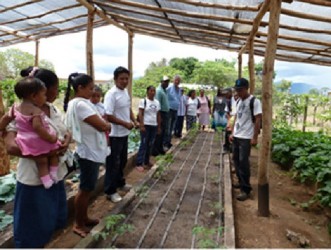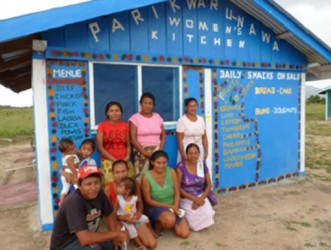The community of Parik-warunawa (PK) in Central Rupununi recently celebrated the handover of a women’s livelihood project funded by the New Zealand High Commission Head of Mission Fund (HOMF).
A press release from HOMF said that the project started as a way of reviving the income generation activities of the PK Women’s Group.
It had three distinct elements: the resumption of upgraded sewing, including new and refurbished machinery,

high quality new frames manufactured by community carpenters under the supervision of a professional woodworking instructor and three days of training in basic machine repairs by a qualified and contracted Singer technician; the upgrading of a hut into a fully functional, hygienic and well-equipped kitchen capable of serving hot meals and snacks and establishing a one-acre vegetable garden, including a shade garden which is the first community-owned and operated shade garden in the region.
Aside from the funding and co-ordination of logistics, all other inputs and outputs were taken care of by the indigenous community with technical support provided by local resources. Specifically, the local branch of the National Agricultural Research and Extension Institute (NAREI) has led to the development of valuable partnerships that will help to contribute to the sustainability of the project.
“Their achievement should be used as a case study on successful implementation of correctly targeted funding for projects that are community owned and supported by locally available and accessible technical experts with hands-on experience,” said Behi Barzegar, field co-coordinator for the project.
Toshao John Daniels, who did some of the hard labour of cutting and preparing the wood, was pleased with the results. “It shows what we can do, when we work together,” he said, according to the press release, adding that it made him feel good to see the results of this project which would be an example to the younger generation.
Brian James, the community appointed president of the Kitchen Garden Committee, accompanied villagers to the garden where there are currently rows of bora, tomatoes, shallots, calaloo and okra thriving and the nursery bed is flourishing with seedlings for pumpkins, cucumbers, celery and peppers.

Violet Eusebio, Chairperson of the Women’s Group is proud of the way the members have volunteered to work in the kitchen and turned it into a vibrant snackette. The next step is to obtain food and hygiene certificates for the members and license the premises. There is also renewed interest in fundraising activities with plans in train to procure materials for the sewing group after the school uniform activities have ended.
The staff of NAREI, in particular, Senior Technical Advisor Benjamin Frank and Field Officer Joseph Gonsalves were pivotal to the success of the garden and shade-house, the release said. In addition to providing technical advice, they also assisted in procuring and transporting much of the materials.
Members of the women’s group are operating the kitchen on a voluntary basis until it is sufficiently established to provide income for the group.
The kitchen provides for children, teachers and working members of the community as well as visitors and travellers who pass through on their way South.









